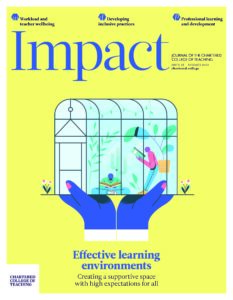‘I did it!’: Valuing resilience in the Early Years

Verity Downing, Early Years Practitioner and Doctoral researcher, UK
Practicing resilience is an ongoing and ever-changing life project, yet, by the time students leave the Early Years Foundation Stage (EYFS) and progress to Key Stage 1, it is expected that they will be ‘confident to try new activities and show independence, resilience and perseverance’ (Early Education, 2021, p. 61). For many children, their initial experience of an EYFS setting will represent their first encounter with a substantial challenge, thus, during this time, the foundations of resilience are formed, tested and developed. Fostering resilience (‘the capacity to cope with, adapt to, and recover from setbacks or adversity’; Early Education, 2021, p. 121) in children is not to disregard valid emotions, belittle distress or overlook disappointment; it is to acknowledge that young children’s inherent tenacity and courage should be afforded due respect, and that they are capable of becoming learners who are determined, confident and prepared to engage with the world. Early Years practitioners, in partnership with parents and carers, have the opportunity to support their students to establish and strengthen the necessary skills that will support them in the navigation of both current and future complex situations. This article will discuss developing resilience in young children and offer a selection of applications that practitioners may consider integrating into their practice.
What is resilience and why is it important?
Resilience has been defined as ‘the ability to overcome serious hardship’ (Center on the Developing Child, 2021) and can be visualised as a set of scales in which ‘protective experiences and coping skills on one side counterbalance significant adversity on the other’ (Center on the Developing Child, 2021). This image acknowledges the fact that children will undoubtedly face challenges, which can be seen as positive learning experiences, and that Early Years practitioners can work to equip their students with the necessary qualities to brave these challenges.
It could be argued that children should not be overly protected from a degree of healthy challenge; however, to be resilient does not ‘mean that a person won’t experience difficulty or distress’ (American Psychological Association, 2020). Practitioners must remain mindful that while many children have strong characters, the trap of falling into thinking that children will ‘just adapt’ may be doing them a disservice. Practitioners must endeavour to get to know their students well so that they can judge the level of challenge and emotional support that is needed, as a lack – or abundance – of resilience presents differently within each child.
McGonigal (2012), in her TEDGlobal talk, suggests that resilience can be split into four types: physical, mental, emotional and social. Those familiar with the EYFS will recognise that these categories relate closely to the prime areas of communication and language, physical development, and personal, social and emotional development (DfEDepartment for Education - a ministerial department responsi... More, 2021). These areas, and the students’ development within these, underpin their quantifiable learning, such as maths and phonics proficiency, and emphasise that happy and successful students likely exhibit resilient tendencies. Such tendencies include perseverance and being ‘good at solving problems and learning new skills’ (Raising Children Network, 2021). It is thought that students who show strong resilience traits may well excel academically (Public Health England, 2014), and with regard to the long term, the effects of EYFS experiences on later life are well established: ‘experiences during the early years strongly influence a child’s future development’ (Early Education, 2021, p. 16).
While an individual may not be born resilient, they can be taught to be, as ‘the flexibility of brain cells and pathways in the early years means that the brain’s architecture is altered in response’ (Early Education, 2021, p. 20) to experiences, highlighting the importance of the experiences that children have within this educational sector in terms of preparing them for the future. Despite this, the temptation to quantify and test resilience must be resisted. This part of a student’s ongoing personality development, which will not be complete by the end of the EYFS, will be encouraged by sensitive and responsive practitioners, not by becoming a test criterion.
Challenges within the EYFS
Within this piece, I am referring to general low-level challenges and stresses that many children will encounter, and not extreme trauma, which fewer children may experience and which would likely call for the support of appropriately trained professionals. Zegans (1982, cited in Mindes and Jewett, 1997) suggests that children respond to stress in four phases. These are ‘alarm’, finding ‘meaning’, establishing ‘coping strategies’ and then the implementation of these strategies (p. 172). Practitioners can support children during all of these stages, in order, by sensitively responding to each child’s immediate reaction, explaining in appropriate language what is happening, suggesting a response and praising the child for their subsequent behaviour. This in turn builds a child’s resilience, as they are being equipped with the tools necessary to keep the aforementioned metaphorical scales balanced.
For many children, the most substantial challenge that they will likely face in an EYFS setting is the task of developing a support system away from their family. Outside of their family unit, how are children to react if the big block keeps knocking over the little block when they are tower-building, or what are they to do if another child refuses to share their bike? Children will likely either rely on themselves to stay positive, latch onto an adult or peers, or withdraw. The principal role of an Early Years practitioner is to provide emotional support, which will guide children through these fears and frustrations to build a healthy degree of confidence and self-reliance.
These experiences are universal challenges that many children will experience; however, for children who, at the time of writing, are between one and five years of age, this challenge may be greater. They may well have had fewer opportunities to engage with challenge away from their families than previous generations due to COVID-19-related restrictions, which gave them limited opportunities to mix with other children, either at school or socially. Practitioners will need to be exceptionally aware of the challenges that these children could face and should allow additional time, input and provision to support these students.
While there is a case for providing students with an extrinsic reward (such as a sticker or a certificate) for their endeavours, and this is often commonplace in EYFS settings, this ultimately relies on an adult’s reaction to a child’s behaviour. If resilience and self-regulation are to be honed, children should be encouraged to enjoy being intrinsically motivated and should have ample opportunities to be so. Research by Deci (1971, cited in Di Domenico and Ryan, 2017) uncovered the fact that ‘tangible rewards can undermine intrinsic motivation’ (p. 1). Students who are intrinsically motivated engage in an activity ‘because they find it interesting and inherently satisfying’ (Di Domenico and Ryan, 2017, p. 1). Suitable verbal and demonstrative alternatives to an extrinsic reward that praise self-efficacy and autonomy include asking children whether they are proud of themselves, whether they would like to take a picture of their creation/completed work, or whether they would like to share it with the class. This proves to the students that resilience is worthwhile, as their efforts will be rewarded in the form of self-satisfaction.
Fostering resilience in the EYFS classroom
Children should be respected as autonomous, inquisitive and determined individuals who are offered the implementation of resilience-building strategies as and when they are necessary, and not to the detriment of self-exploration. Resilience can be encouraged within the context of a supportive environment where trial and error and failure are welcomed, persistence is praised and self-awareness and self-regulation are prioritised. It is also necessary for children to be taught that ‘uncomfortable emotions don’t usually last forever’ (Raising Children Network, 2021). This is a thought that often troubles young children but can be somewhat overlooked by adults.
Practitioners can create a resilience-building pedagogy within three broad areas: relationships, language and opportunities.
Relationships
In the EYFS, the relationships that students share with their practitioners underpin the entirety of their learning: ‘warm, trusting relationships with knowledgeable adults support children’s leaning more effectively than any amount of resources’ (Early Education, 2021, p. 33). Practitioner–student relationships create a safe space in which children feel comfortable to ‘have a go’ and persevere when things go wrong. Practitioners who are attuned to their students’ needs will be in the best position to successfully validate and acknowledge a child’s emotions while giving them the power to manage them. This can be achieved by ‘deciding when to step back and when to offer support, encouragement and stimulation’ (Early Education, 2021, p. 19). These practitioners will also likely find that they are able to support children into channelling any ‘negative’ emotions into energy and determination, which can be used to the child’s benefit.
Language
Feelings and frustrations should be openly discussed in Early Years settings. This can be done so directly, during PSHE lessons and circle times, through reading relevant books and by setting particular tasks with an explicit goal, or indirectly, by integrating them into the general discourse that is present within the setting. Practitioners who model making mistakes and finding solutions through carefully chosen language are helping to create this discourse. After making an error, practitioners may say, ‘I got that wrong. That was because I was rushing. I need to slow down and next time I will try it like this instead.’ By narrating the thought process of recognising an error, practitioners are giving their students permission to do the same, while making the language that they will need to do so easily accessible. This removes a level of frustration that could quickly become a barrier to emotional expression. Practitioners may also consider revisiting this initial error when they eventually complete the challenge, to model perseverance and achievement.
Opportunities
Practitioners must ensure that there is an adequate amount of challenge available to their students. There should be a balance between ‘easily achievable’ and ‘eventually achievable’ tasks that act as short- and long-term challenges. For example, resources should be available in the setting that, while age-appropriate, a child may not be able to master straight away. This will likely become an area of adult intervention, as students may need encouragement to both engage in such a task and persevere with it. This example alludes to the work of Wood et al. (1976) and the concept of ‘scaffolding’ (p. 90). This is the idea that with sensitive and appropriately pitched adult support, children will be able to take steps towards acquiring new skills that may well be out of their reach independently. These activities will act as opportunities for practitioners to gauge and enhance students’ resilience through gentle encouragement.
Concluding thoughts
It is argued that ‘emotional wellbeing is the first necessity for successful learning, and adults who respect children’s feelings, show empathy, and support children to manage their feelings are helping to lay the foundations for development and learning’ (Early Education, 2021, p. 32). It is a unique challenge for Early Years practitioners to foster ‘independence, resilience and perseverance’ (Early Education, 2021, p. 61) among their students at the beginning of their educational journey. Without resilience, determination, self-awareness and a positive attitude, students may face insurmountable challenges throughout their lives that will disadvantage them. Early Years practitioners who are able to sensitively channel their students’ emotions into positive energy are setting their students off on a pathway to success, where feelings of stress, trepidation and self-doubt can be overcome by students who have become accustomed to recognising and managing their emotions. If every ‘negative’ is presented and received as an opportunity for challenge and growth, rather than a reason for defeat and capitulation, practitioners will likely experience that especially satisfying moment when a student, after endless independent endeavours, defiantly exclaims, ‘I did it!’ much more often.
- American Psychological Association (AMA) (2020) Building your resilience. Available at: www.apa.org/topics/resilience (accessed 1 December 2021).
- Center on the Developing Child, Harvard University (2021) Resilience. Available at: https://developingchild.harvard.edu/science/key-concepts/resilience (accessed 1 December 2021).
- Department for Education (DfE) (2021) Changes to the early years foundation stage (EYFS) framework. Available at: www.gov.uk/government/publications/changes-to-the-early-years-foundation-stage-eyfs-framework/changes-to-the-early-years-foundation-stage-eyfs-framework (accessed 1 December).
- Di Domenico S and Ryan R (2017) The emerging neuroscience of intrinsic motivation: A new frontier in self-determination research. Frontiers in Human Neuroscience 11: 1–14.
- Early Education (2021) Birth to 5 Matters: Non-Statutory Guidance For the Early Years Foundation Stage. St Albans: Early Education.
- McGonigal J (2012) The game that can give you 10 extra years of life. TEDGlobal. Available at: www.ted.com/talks/jane_mcgonigal_the_game_that_can_give_you_10_extra_years_of_life/up-next?language=en (accessed 1 December 2021).
- Mindes G and Jewett J (1997) Reviews of research: Childhood stress. Childhood Education 73(3): 172–173.
- Public Health England (2014) Local action on health inequalities: Building children and young people’s resilience in schools. Available at: https://assets.publishing.service.gov.uk/government/uploads/system/uploads/attachment_data/file/355766/Review2_Resilience_in_schools_health_inequalities.pdf (accessed 1 December 2021).
- Raising Children Network (2021) Resilience: How to build it in children 3–8 years. Available at: https://raisingchildren.net.au/school-age/behaviour/understanding-behaviour/resilience-how-to-build-it-in-children-3-8-years (accessed 1 December 2021).
- Wood D, Bruner J and Ross G (1976) The role of tutoring in problem solving. Journal of Child Psychology and Child Psychiatry 17: 89−100.










